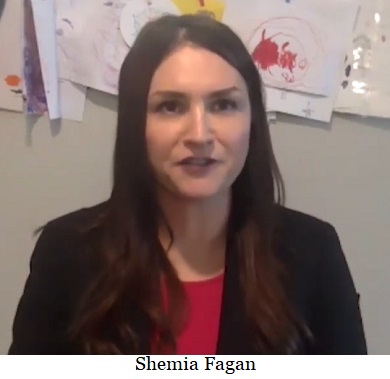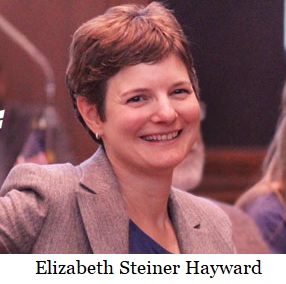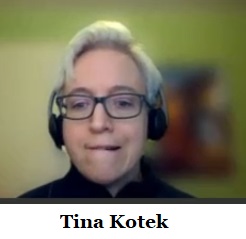
On this day, August 27, 2019, jet-car speed racer 30-year-old Jessi Combs, known by fans as the "fastest woman on four wheels," died in a crash in the Alvord Desert in Southeastern Oregon while trying to break a speed record.
 Post an Event
Post an Event
| Benton County Republicans’ Private Fundraising Event, “Bent-on Boots and Bling” with Trey Taylor |
| Friday, September 5, 2025 at 5:00 pm |
| Featuring Trey Taylor
Music Private Event
Friday, September 5, 2025 5:00-5:30 pm VIP Reception
5:30-8:00 pm Heavy Appetizers,
Auction, Concert
Red: $750 VIP Reception
Front Row Table Sponsor
White: $500 Table Sponsor
Blue: $50 per person
Limited Seating. Get Yours Now!!!
Support Local
Dress up: Bling, Cowboy, Patriotic Benton County Republican
FUNDRAISER
www.BentonGOP.org
Get your tickets today at:
https://www.bentongop.org/event-details/benton-county-republicans-fundraiser/form
About Trey:
Trey is the youngest African American Man in Country Music History. The Denver Post wrote
"It's impossible to miss his enthusiasm. With a fondness for cowboy boots, gaudy colors and dazzling jewelry, Trey Taylor could stand toe to toe with any of the Pop, Country or even Rap
contemporaries of his generation.“ |
| Trysting Tree Golf Club, 34028 NE Electric Rd., Corvallis |
Legislation would block independent journalists
HB 2486 can certainly be described as anti-independent-journalism legislation. It is proposed legislation by three Oregon Democrat legislators that would take away the power to bring important news to the people of Oregon from any organization who is not credentialed though the government.
When government heavily mandates journalism, the truly free press cannot easily or accurately portray the news of the stories happening around us, information that we all rely on for various reasons. Free speech in danger can endanger us all.
Representative Karin Power (D-Portland) and Representative Julie Fahey (D-Eugene) are the Chief Sponsors of this bill as well as being Regularly Sponsored by Representative Marty Wilde (D-Eugene). The law proposes to grant favoritism to only select main stream media outlets.
The proposed law states that it would give officials of public bodies the power to grant news media representatives access to scenes of emergencies or emergency police activity that are otherwise closed to the public. It does provide exceptions when access may be denied.
Perhaps most disturbingly, the bill directs the Department of State Police to develop guidelines for press credentialing.
A D V E R T I S E M E N T

A D V E R T I S E M E N T
Furthermore, the law also requires the department to consult with law enforcement and fire department personnel, representatives of local governing bodies and representatives of news media organizations in developing those guidelines.
And, as usual in Oregon, the Emergency Clause has been attached to this legislation, which would make the law instantly effected into law.
Apparently it is added in the law that access to scenes of emergencies or emergency police activity may be denied if the presence of news media representatives or the activities being conducted by new media representatives compromise the safety of emergency response employees, impede the response of emergency equipment or personnel or impede the investigation of the incident that constitutes the scene of emergency or emergency police activity.
Nothing in this alters the applicability of Federal Aviation Administration regulations that govern the closure or restriction of airspace over incidents.
--Bruce Armstrong| Post Date: 2021-03-20 13:29:05 | Last Update: 2021-03-20 16:38:10 |
“Democrats are intentionally putting felons inside the classroomâ€
HB 2942 which would allow individuals convicted of drug dealing, sex crimes into K-12 settings, and open the door to convicted criminals working and volunteering in K-12 educational settings has passed out of the Oregon House Judiciary Committee. It is now headed to the House Committee on Education. The bill is sponsored by Representative Bynum (D-Clackamas), Senator Michael Dembrow (D-Portland), and former State Representative Diego Hernandez (D-Portland).
HB 2942 would create a pathway for individuals charged and convicted of crimes such as manufacturing and/or delivering hard drugs like cocaine, heroin and meth or prostitution—including crimes targeting children within 1,000 feet of a school—to be eligible to work in school settings.
“It’s completely unacceptable that the Salem supermajority is intentionally putting felons inside the classroom and on the playground with our kids, even when their crimes included making and selling hard drugs next door to a school,†said House Republican Leader Christine Drazan (R-Canby.) “Keeping our children safe means keeping convicted criminals out of our classrooms.â€
HB 2942 would let the Teacher Standards and Practices Commission, the state agency in charge of licensing teachers, allow individuals convicted of certain crimes to work in a classroom setting. If
HB 2942 passes, Oregon’s youngest students could be in the care of role models who will guide their social and emotional development and stand at the head of a classroom with convictions that include:
- Unlawful manufacturing within 1,000 feet of a school of: hydrocodone, methadone, oxycodone, heroin, methylenedioxymethamphetamine, cocaine, methamphetamine, and other controlled substances.
- Unlawful delivery within 1,000 feet of a school of: hydrocodone, methadone, oxycodone, heroin, methylenedioxymethamphetamine, cocaine, methamphetamine, and other controlled substances.
- Unlawful delivery of hydrocodone, methadone, oxycodone, cocaine and methamphetamine.
- Prostitution
The hearing in the House Committee On Education is scheduled for March 30 at 1:00pm.
--Staff Reports| Post Date: 2021-03-20 06:50:37 | Last Update: 2021-03-20 21:05:35 |
What about connectivity and the digital divide?
Over the past year, Oregonians have figured out how to continue to conduct business virtually. The Oregon Legislature and other publicly elected bodies are no different. April 15, 2020 Governor Kate Brown announced
Executive Order 20-16 which stated:
During this emergency, state and local governments must continue to operate, provide essential services, and make decisions in a public and transparent manner. Governments must do so safely, consistent with my emergency directives. Public participation is essential to the functioning of our state and local governments, but in-person attendance at public meetings presents a risk to the public health and safety of Oregonians, unless appropriate measures are taken. Thus, during this emergency, public meetings should be held via telephone, video, electronic or other virtual means, whenever possible, to keep Oregonians safe, and to mitigate the spread of COVID-19.
Shortly after that, during the 1st special legislative session in June of 2020, the legislature passed
HB 4212 which codified into law the ability of public governing bodies to be able to conduct public business remotely until 30 days after the end of the declaration of a state of emergency expires.
One year later, the 6th extension of state of emergency keeps
HB 4212 in place. School boards, city councils and the legislature continue to operate in the virtual world. Now, the legislature would like to see this practice become permanent through the introduction of
HB 2560 by Representative Meek (D-Gladstone) and Senator Steiner Hayward (D-Portland). This legislation would require meetings held by public governing bodies to reasonably provide opportunities to the general public to access and attend the meeting by telephone, video, or other electronic or virtual means and to allow oral and written testimony by electronic or virtual means.
During a hearing on the bill earlier this month a great deal of written testimony was submitted, but only a hand full of people signed up to testify virtually in person. One of those was Mary Kyle McCurdy with 1,000 Friends of Oregon. She expressed support for the bill stating, “Remote access to public hearings and meetings opens these to so many more Oregoniansâ€. Kathryn Jernstedt with Friends of Yamhill County also testified on the bill. Although she was in favor of the bill, she wanted to make sure that it was “not the only option because there are barriers to this as we well as the pre-COVID systemsâ€. She was specifically concerned with connectivity and the digital divide. Ironically, during her testimony, her connection to the meeting had issues adding validity to her concern.
A D V E R T I S E M E N T

A D V E R T I S E M E N T
Mark Landauer with the Special Districts Association of Oregon also testified on the legislation. He reminded the committee that “it was local government that originally approached the governor asking for this type of electronic communication to be allowedâ€. They knew that they were not going to be allowed to conduct business in traditional ways during the State of Emergency, but the business of the people needed to continue. However, if made permanent, challenges remain with actual implementation and managing public expectations. There are 950 special districts that hold public meetings is some manner. They are not all going to have the capabilities to livestream meetings considering that at least 300 of them don’t even have websites currently.
The bill was amended in committee for a technical fix and
HB 2560 is headed to the House floor for a vote.
--Terese Humboldt| Post Date: 2021-03-19 18:05:43 | Last Update: 2021-03-19 18:31:22 |
Accelerated Vaccination Timelines given by Governor Brown
Multiple journalists could not get a straight answer from Oregon's Governor Kate Brown
in a press briefing with the Oregon Health Authority on Friday, March 19th, 2021.
She was asked why front-line workers were not highly prioritized for COVID vaccinations in Oregon as neighboring state Washington had done and as the CDC had recommended, but all that reporters got for an answer from her seemed rather hollow and disingenuous.
Governor Kate Brown held the press conference to announce Oregon’s accelerated vaccination prioritization timelines.
The Governor was joined by Patrick Allen, Oregon Health Authority (OHA) Director; Dr. Dean Sidelinger, State Epidemiologist; and Holden Leung, Chief Executive Officer of the Asian Health & Service Center.
A D V E R T I S E M E N T

A D V E R T I S E M E N T
"As vaccination efforts speed up, I want to thank Oregonians once again for making smart choices throughout this pandemic. Oregon continues to hold one of the lowest infection and mortality rates in the entire country. We have the fourth lowest infection rate since the start of the pandemic, and fifth lowest mortality rate. " said Governor Brown. "As we open up eligibility to all Oregonians on May 1st, I remain committed to the equitable distribution of vaccines for our seniors, frontline workers, and Oregonians with underlying health conditions."
"The Oregon Health Authority tells me that, provided supplies come in from the federal government as anticipated, we expect to have enough doses for every Oregonian who wants a vaccine to have the opportunity for at least a first dose by the end of May."
- Starting March 22, counties that can attest to largely finishing vaccinations for Oregonians 65 and older can move to the next prioritization groups.
- No later than March 29, vaccinations may begin for Phase 1B, Group 6, which includes people aged 45 and older with underlying conditions and some groups most vulnerable to COVID-19.
- On April 19, vaccinations may begin for Phase 1B, Group 7, which includes all frontline workers and people with underlying conditions aged 16-44.
- On May 1, all Oregonians age 16 and older will be eligible for COVID-19 vaccination.
--Bruce Armstrong| Post Date: 2021-03-19 16:58:28 | Last Update: 2021-03-19 18:45:40 |
More emergency powers for Oregon’s Governor
HB 2305 and
HB 2308 are being considered by the super-majority Democrat Oregon legislature, and are bills that would assign further emergency powers for the state's governor.
Observers in Oregon have noted current Governor Kate Brown's response to a variety of emergencies over her tenure, especially as of late, and her decisions do not always inspire confidence. More gubernatorial emergency powers might not be a good thing at this time, as checks and balances are still quite important in government.
Both HB 2305 and HB 2308 are sponsored by Representative Paul Evans (D-Monmouth), and could easily be passed with support from the super-majority Democrats, who currently have control of the state legislature.
A D V E R T I S E M E N T

A D V E R T I S E M E N T
Details within those proposed laws include the following:
Authorize the Governor, if necessitated by emergency, to require any person in this state to accept and fulfill orders for manufacture, sale or distribution of certain goods.
The bills do specify conditions under which a person may reject such orders.
It also provides that "a person that accepts order is not liable for contractual damages resulting from act or omission necessary for compliance with Act".
--Bruce Armstrong| Post Date: 2021-03-19 12:39:57 | Last Update: 2021-03-19 13:25:22 |
Spoiler alert: Democrats in the Legislature aren’t helping the situation
Editor's note: This article was adapted from a presentation to clients of Portland area realtor Royce Rogers.
Oregon has a housing shortage. The Urban Growth Boundaries, created by Oregon's land use laws in the early 1970s, are filling up. Supply and demand drive prices of single-family homes to levels that are unaffordability. Apartments must provide a higher percentage of dwellings.
Unfortunately, new regulations show a disconnect between policy makers and the incentives that cause risk takers to build apartments. In December 2016, Portland’s City Council enacted a strong inclusionary housing requirement that all new apartment buildings in Portland would have to set aside a portion of their units for low- and moderate-income housing. The new requirement didn’t kick in until February 2017, and because the requirement applied to nearly all apartment buildings with 20+ units there was a land rush of developers who filed under the old rules which in turn produced a temporary flood of new apartment buildings, that have, over the past four years, mostly been built.
This decline in multifamily permits signals trouble for Portland's apartment supply for the coming years. While in the short-term rent increases have been minimal and supply has increased, national forecasters like Zillow are predicting a rapid rebound in demand for urban markets post-pandemic. That has owners of existing apartments with an excellent chance to profit in Portland as housing providers continue to stay one step ahead of politicians enacting feel-good ordinances. The new requirements have also signaled more permanent changes. One of the key aspects of the requirements is that it exempts buildings that have less than 20 units, which has prompted many developers to shift to smaller buildings.
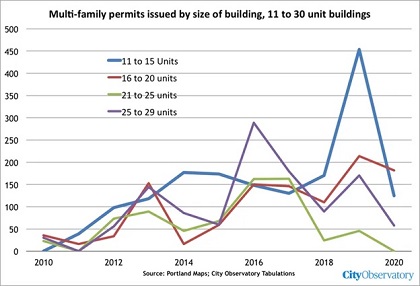
This has also led developers to get creative as the requirement of 20 units only applies to a single building, meaning you can build multiple buildings in one development project. There is a good example in Northwest Portland where developer Noal Johnson is building eight five-story residential buildings which total to 145 units although each individual building contains less than 20.
Overall inclusionary zoning may have helped with supply and rents in the short term but the fact that very few new buildings are being built now will hurt Portland in the near future. The new apartments that aren’t being built now in Portland will almost certainly lead to higher rents and less affordability in the years ahead—exactly the opposite of the expressed intentions of those who enacted this policy.
--Tom Hammer| Post Date: 2021-03-18 16:26:05 | Last Update: 2021-03-18 11:58:43 |
The Constitution gives the Legislature authority over the process
The Oregon Department of Justice, led by Attorney General Ellen Rosenblum (D-Portland) on behalf of Secretary of State Shemia Fagan (D-Portland), has filed a response to the Oregon Legislature’s petition for a writ of mandamus, related to state Legislative redistricting, with the Oregon Supreme Court. A writ of mandamus is a directive by the courts to a government to have them act or cease acting.
Secretary Fagan’s response notes that the Legislature’s requested delays in redistricting timelines for state Legislative maps will require moving the 2022 primary elections in all 36 counties and numerous other elections-related deadlines. The response demonstrates that the Legislature can access quality population data from the U.S. Census Bureau’s partner in Oregon, the Population Research Center, and can use that data to produce redistricting maps without delay, leaving opportunities to incorporate Census data when it becomes available.
“As Oregon’s chief elections officer, I am responsible for safeguarding the elections process for all Oregonians. I am deeply concerned about the ability of our state’s county clerks to administer stable, predictable elections next year if the Legislature is successful in moving deadlines and changing 2022 election dates,†Secretary Fagan said. “As detailed in our response, moving the 2022 May primary would strain county and state resources and risk significant voter confusion at a time when it is more important than ever for us to build and maintain public trust in our elections. We owe it to Oregonians to do everything we can to fulfill our constitutional obligation on time and without impacting the 2022 elections.â€
In the filing, Interim Oregon Elections Director Brenda Bayes detailed the list of potential impacts on the state’s 2022 election cycle if state Legislative redistricting dates are allowed to be pushed out 60 days after the redistricting data arrives. Those potential impacts include:
- Shifting dates could affect the primary and general election in 2022;
- The expense of substantial time and resources spent informing voters and candidates about the changes to long established election dates and related deadlines;
- The risk that candidates file and run in a May primary for a district with boundaries that change, disqualifying them from seeking office;
- Potential for disproportionate harm to candidates with fewer financial resources;
- Significant technical reprogramming costs for state and county governments; and
- The potential to inflame misinformation and distrust in elections.
A D V E R T I S E M E N T

A D V E R T I S E M E N T
Each decade, states are required to redraw boundaries for state Legislative and federal Congressional districts to account for population changes. Oregon’s state Legislative redistricting process is detailed in Article IV, section 6 of the Oregon Constitution. The Constitution gives the Oregon Legislature clear authority over the process, with the Secretary of State as a backstop if, for some reason, the Legislature is unable to complete its process. The process for federal Congressional redistricting, which redraws Oregon’s district boundaries for the United States House of Representatives, is guided by state law with the Oregon Supreme Court as a backstop. The Secretary of State has no role in federal Congressional redistricting, which is not addressed in the Legislature’s petition.
--Staff Reports| Post Date: 2021-03-18 13:59:43 | Last Update: 2021-03-18 14:05:57 |
Democrats promise program they know they can’t deliver
After 8 failed attempts, Senate Democrats rammed through
SJR 12 legislation that promises utopian health care coverage. The results of which would degrade the quality of care and take away health care choices for Oregonians. The resolution was introduced by Senator Elizabeth Steiner Hayward (D-Portland) and Representative Rob Nosse (D-Portland)
According to a 2017 report commissioned by the Legislature, a government-controlled health care system is completely unfeasible. The system would blow out the budget by requiring a 134% increase in state taxes. This would include an 83% hike in income taxes and a new 6.5% payroll tax on small businesses. The total cost of government-controlled healthcare would be over $70 billion per budget cycle.
“This bill promises something that Democrats know they can’t deliver,†Senate Republican Leader Fred Girod said. “The bill doesn’t fund any system to deliver on that promise. If Democrats are serious about giving Oregonians free health care, they should come up with an actual plan. This kind of lazy policymaking lacks important details Oregon voters need to make an informed decision at the ballot box.â€
The Oregonian Editorial Board and League of Women Voters have opposed this measure because of its obscurity.
Government-controlled health care would be a travesty for Oregonians. It would degrade the quality of care by limiting choices and make Oregonians wait for important care.
Government-run health care leads to longer wait times for important medical care and takes away individual health care decisions from Oregonians. Oregon’s 2017 report confirmed that government-controlled health care would cause ‘congestion’ (read wait times).
“This unfunded mandate is one of the final steps to completely government-controlled health care,†Senator Tim Knopp (R-Bend), Vice-Chair of the Senate Health Care Committee, said. “There is a reason similar plans have been spiked in other deep-blue states. It would destroy quality health care in Oregon.â€
A D V E R T I S E M E N T

A D V E R T I S E M E N T
SJR 12 fails to outline a plan as to how the state is going to give unlimited health coverage to everyone. That raises concerns that the courts will ultimately force political branches to create a backdoor system with little public involvement or transparency.
Senate Democrats voted down a motion that would have given Oregonians clarity on how much the proposal would cost.
If passed by the House of Representatives, the amendment would be put to voters on the November 2021 general election.
--Staff Reports| Post Date: 2021-03-18 12:09:04 | Last Update: 2021-03-18 12:27:12 |
We keep spending money and not solving the problem
HB 2004 takes money from the General Fund and the Community Services Revolving Account for low barrier shelters which goes to DAS to create navigation centers. Housing and Community Services is directed to study the issue. It has bipartisan support.
HB 2006 defines an "emergency shelter" and requires local governments to allow siting of qualifying emergency shelters by qualifying entities notwithstanding land use laws and regulations. Three Republicans cosponsored this bill and coincidently their districts would get money. Both bills were introduced by House Speaker Tina Kotek (D-Portland).
The homeless situation is on many minds these days and the legislature is attempting to show the voters that they care. Using $27 million in grant money as bait and an additional $18 million in direct payments to cities with representatives on the committee sponsoring
HB 2004, money will be appropriated for a popular concern. Is that the right way to go?
The history of caring for the unfortunate relied on mutual aid societies -- churches, fraternal organizations, dedicated non-profits. They supplied charitable services to the less fortunate. Government has slowly replaced many of those volunteer efforts and continues its quest for market share. Mutual aid societies have paid staff but were, and still are, heavily dependent on dedicated volunteers with intimate knowledge of the challenges they face and personal commitment often through personal experience. The recipients of generosity are vetted constantly. Gaming the system is very difficult with mutual aid societies. In the past, government’s role was in service to the productive sector that financially sustained those seeking charity through mutual aid societies. People in need got a temporary hand up, not a permanent handout.
Fast forward to today, and we see government doing what it can to increase and centralize power. Enticing municipalities through grants, state government grows in size while enlarging dependency on state government. Those who “are down on their luck†are just pawns in the game. Representatives bring the pork home to their constituencies, claiming humanity and solutions for the common good.
Examples of mutual aid societies doing the highest quality work at a fraction the cost versus government are everywhere. If politicians feel they must address every highly visible problem that has its day in the sun, maybe they could incentivize local communities to use the systems they already have in place. Multiple tax credits for donations to outfits like Union Gospel Mission in Salem, the Salvation Army, St. Vincent DePaul in Eugene and dozens of other non-profit groups doing yeoman’s work would support those currently most effective and give a greater return on taxpayers dollars.
Addiction and mental health problems are at the core of homelessness. The breakdown of the family structure plays a big role of this growing social phenomenon as well. Can we buy our way to a solution? No. Should we rely on politicians to find answers? This is a tough love situation, who can supply the tough love? Probably not your rich uncle from out of town.
--Tom Hammer| Post Date: 2021-03-18 11:58:43 | Last Update: 2021-03-18 12:09:04 |
Fairs and festivals will begin to make decisions as to their plans for Summer
Could we see outdoor celebrations return this summer?
Today Governor Brown and the Oregon Health Authority announced some changes to the capacity guidelines for outdoor events in anticipation of County fairs and festivals this Spring and Summer. The new guidelines for capacity are tied to the current Oregon Health Authority Sector Risk Level Guidance Chart. However, the guidelines for new outdoor entertainment establishments including zoos, gardens, theaters, stadiums and fairs and festivals, changed effective March 17th they are now:
- Lower risk: Maximum 50% occupancy
- Moderate risk: Maximum 25% occupancy
- High risk: Maximum 15% occupancy
- Extreme risk: Maximum 50 people
Closing times for all outdoor Entertainment is 11pm except Low Risk which is midnight.
Early to announce was Linn County Fairgrounds. Tuesday at the Linn County Commissioners meeting,
Commissioner Roger Nyquist announced “I’ve had some dialogue with the public health community at the state level that led me to believe that by the time we get to mid-July, we’ll be able to host a county fair,†he continued “I’m an optimist, so I think that the people who have enjoyed going to the Linn County Fair in the past should expect to do so come July.â€
A D V E R T I S E M E N T

A D V E R T I S E M E N T
While this is good news, it also indicates that the end to social distancing and limits on social gatherings may not be returning to normal in the near future. On February 25, 2021, Governor Brown signed
Executive Order 21-05 which extended the state of emergency declaration through May 21, 2021. This is the 6th extension of the original declaration of emergency from 2020. The next extension, if done, would be issued before the current one expires and would could last another 60 days or up until July 20th. If a return to normal was expected before summer, the new OHA guidelines and capacity restrictions would not be necessary. Until then, fairs and festivals will begin to make decisions as to their plans for Summer.
 --Terese Humboldt
--Terese Humboldt| Post Date: 2021-03-18 07:30:00 | Last Update: 2021-03-18 07:52:05 |
Your grandma would have called it soot
This Legislative session, like 2019 and 2020, has seen multiple bills relating to environmental impacts and climate change.
HB 2479 introduced by Representative Karin Power (HD41 – Milwaukie) in one in a series this session that proposes a solution to climate change mitigation.
At a hearing on March 1st Representative Power introduced the bill to the committee stating “In order to help integrate the scientific importance of black carbon into our state planning
HB 2479 (is needed) to modify the definition of greenhouse gasses to include black carbonâ€. With the definition modified, the Department of Environmental Quality will then have the ability study black carbon specifically and look for mitigation strategies to reduce it.
Dr. Erika Maria Moseson, MD, MA,a Pulmonary & Critical Care Medicine Physician, testified in support of the bill. She said, as a physician, she knows that it is “Vitally important to get the diagnosis right before you treat. Actually, measuring black carbon will help us diagnose where we need to focus to save lives.â€
Representative Brock Smith (R-Port Orford) recalled to the committee that throughout all the conversations on cap and trade, carbon sequestration and global warming, “we have talked about diesel emissions being one factor, but black carbon has never been a topic of conversationâ€.
So, what exactly is black carbon?
Drew Shindell, Nicholas Professor of Earth Sciences at Duke university shared with the committee that black carbon is commonly referred to as soot. With that terminology clarification, Representative Brock Smith then shared that it is his understanding that the major global sources of soot are from developing countries and this trend is expected to increase. The largest contributors are Asia, Latin America, and Africa. China and India together account for 25%-35% of the global soot. Drew Shindell agreed, but also noted that the US is still a contributor and although the US has done a good job of continuing to mitigate soot since the passage of the Clean Air Act of 1970, the US has fallen short in addressing specific contributors. He then stated that “those specific contributors are non-highway diesel motors used in construction and farm equipment, ATV’s, and diesel generatorsâ€.
A D V E R T I S E M E N T

A D V E R T I S E M E N T
With the specific target of soot emitters defined by Drew Schindell, the question then becomes, has the conclusion already been drawn that these emitters are already the problem? After all, Representative Power is also one of the chief sponsors of
HB 2674 which proposes to implement an immediate privilege tax on nonroad diesel equipment (construction and farm equipment, ATV’s, and diesel generators) to mitigate their soot contribution to climate change?
--Terese Humboldt| Post Date: 2021-03-18 06:53:53 | Last Update: 2021-03-18 07:47:03 |
Alfa Romero was fraudulently purchased
Portland Oregon is a city riddled with crime these days, sadly and another car theft seems to have been attempted by a suspect carrying a large amount of methamphetamine with them in an Italian sports car.
On March 17, 2021 the Portland Police East Precinct Neighborhood Response Team (NRT) received information about an Alfa Romeo car, which was fraudulently purchased from a dealership near Southeast 92nd Ave and Southeast Stark Street.
NRT officers began investigating and located the car in a nearby motel parking lot. Officers developed information about the suspect and conducted surveillance on the car. When the suspect returned to the car, officers took her into custody.
Officers recovered forged documents, and approximately 164 grams (5.7 ounces) of methamphetamine. Officers returned the car to the dealership.
The suspect was identified as 38-year-old Mary P. Nguyen, who was booked into jail for Aggravated Identity Theft, 7 counts of Forgery I, Aggravated Theft I, Distribution of a Controlled Substance -- Methamphetamine, Possession of a Controlled Substance -- Methamphetamine, Unauthorized Use of Motor Vehicle, and Computer Crime.
--Bruce Armstrong| Post Date: 2021-03-17 17:57:29 | Last Update: 2021-03-17 18:14:05 |
Read More Articles






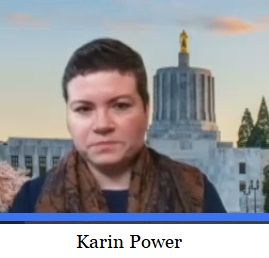

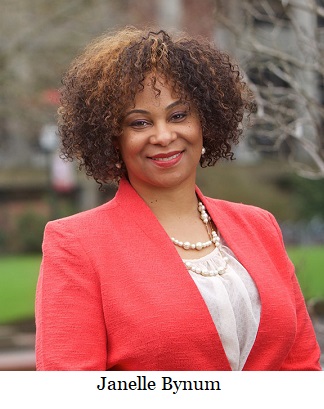
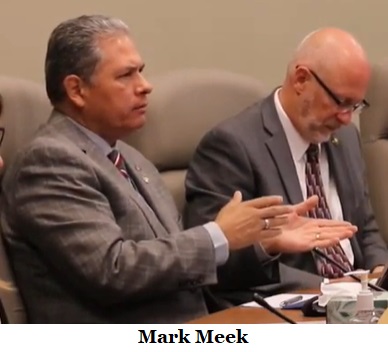



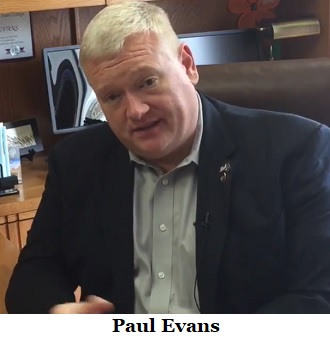


 This has also led developers to get creative as the requirement of 20 units only applies to a single building, meaning you can build multiple buildings in one development project. There is a good example in Northwest Portland where developer Noal Johnson is building eight five-story residential buildings which total to 145 units although each individual building contains less than 20.
This has also led developers to get creative as the requirement of 20 units only applies to a single building, meaning you can build multiple buildings in one development project. There is a good example in Northwest Portland where developer Noal Johnson is building eight five-story residential buildings which total to 145 units although each individual building contains less than 20.
